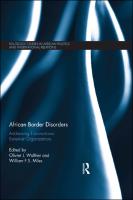African Border Disorders
Proposal review
Addressing Transnational Extremist Organizations
| dc.contributor.editor | Walther, Olivier J. | |
| dc.contributor.editor | Miles, William F.S. | |
| dc.date.accessioned | 2022-04-26T08:39:48Z | |
| dc.date.available | 2022-04-26T08:39:48Z | |
| dc.date.issued | 2018 | |
| dc.identifier | ONIX_20220426_9781351680127_9 | |
| dc.identifier | ONIX_20220426_9781351680127_9 | |
| dc.identifier | OCN: 1004336784 | |
| dc.identifier.uri | https://library.oapen.org/handle/20.500.12657/54175 | |
| dc.description.abstract | Since the end of the Cold War, the monopoly of legitimate organized force of many African states has been eroded by a mix of rebel groups, violent extremist organizations, and self-defence militias created in response to the rise in organized violence on the continent. African Border Disorders explores the complex relationships that bind states, transnational rebels and extremist organizations, and borders on the African continent. Combining cutting edge network science with geographical analysis, the first part of the book highlights how the fluid alliances and conflicts between rebels, violent extremist organizations and states shape in large measure regional patterns of violence in Africa. The second part of the book examines the spread of Islamist violence around Lake Chad through the lens of the violent Nigerian Islamist group Boko Haram, which has evolved from a nationally-oriented militia group, to an internationally networked organization. The third part of the book explores how violent extremist organizations conceptualize state boundaries and territory and, reciprocally, how do the civil society and the state respond to the rise of transnational organizations. The book will be essential reading for all students and specialists of African politics and security studies, particularly those specializing on fragile states, sovereignty, new wars, and borders as well as governments and international organizations involved in conflict prevention and early intervention in the region. | |
| dc.language | English | |
| dc.relation.ispartofseries | Routledge Studies in African Politics and International Relations | |
| dc.subject.classification | thema EDItEUR::J Society and Social Sciences::JP Politics and government | en_US |
| dc.subject.other | Al Qaeda | |
| dc.subject.other | Boko Haram | |
| dc.subject.other | Bruce Whitehouse | |
| dc.subject.other | border conflict | |
| dc.subject.other | Caitriona Dowd | |
| dc.subject.other | Christian Leuprecht | |
| dc.subject.other | Daniel Cunningham | |
| dc.subject.other | David B. Skillicorn | |
| dc.subject.other | Islamic Maghreb | |
| dc.subject.other | Islamic State | |
| dc.subject.other | Jaume Castan Pinos | |
| dc.subject.other | Kristen Tsolis | |
| dc.subject.other | Nikolas Emmanuel | |
| dc.subject.other | Quan Zheng | |
| dc.subject.other | Sahara-Sahel | |
| dc.subject.other | Sean F. Everton | |
| dc.subject.other | Steven M. Radil | |
| dc.subject.other | terrorism | |
| dc.subject.other | terrorist groups | |
| dc.subject.other | Walther | |
| dc.subject.other | West Africa | |
| dc.subject.other | William F.S. Miles | |
| dc.subject.other | William F. Miles | |
| dc.title | African Border Disorders | |
| dc.title.alternative | Addressing Transnational Extremist Organizations | |
| dc.type | book | |
| oapen.identifier.doi | 10.4324/9781315166483 | |
| oapen.relation.isPublishedBy | 7b3c7b10-5b1e-40b3-860e-c6dd5197f0bb | |
| oapen.relation.isFundedBy | University of Florida | |
| oapen.relation.isbn | 9781351680127 | |
| oapen.relation.isbn | 9781315166483 | |
| oapen.relation.isbn | 9781138054684 | |
| oapen.relation.isbn | 9780367278595 | |
| oapen.imprint | Routledge | |
| oapen.pages | 230 | |
| peerreview.anonymity | Single-anonymised | |
| peerreview.id | bc80075c-96cc-4740-a9f3-a234bc2598f1 | |
| peerreview.open.review | No | |
| peerreview.publish.responsibility | Publisher | |
| peerreview.review.stage | Pre-publication | |
| peerreview.review.type | Proposal | |
| peerreview.reviewer.type | Internal editor | |
| peerreview.reviewer.type | External peer reviewer | |
| peerreview.title | Proposal review | |
| oapen.review.comments | Taylor & Francis open access titles are reviewed as a minimum at proposal stage by at least two external peer reviewers and an internal editor (additional reviews may be sought and additional content reviewed as required). |

